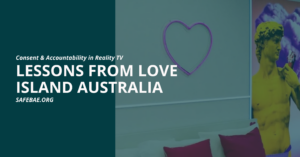Lessons From Love Island Australia
Consent & Accountability in Reality TV
Lessons from Love Island: Accountability and Consent
Reality television isn’t often where you’d expect to find meaningful lessons about consent and emotional accountability, but Love Island Australia has been breaking the mold. Beyond the drama, betrayals, and steamy romances, the show has showcased moments that align deeply with SafeBAE’s mission to create safer spaces and foster healthier relationships.
In one memorable scene, Steph confronts Zane for his treatment of the women in the villa, calling out his behavior with honesty and courage. These moments are raw, often uncomfortable, and undeniably necessary for fostering a culture of respect and mutual responsibility.
Another unique feature of the show is its use of the consent heart lights—an innovation we wish more shows (and the real world) would adopt. These lights, placed above each bed, only illuminate when both participants press a button, signifying mutual agreement before engaging in any intimate activity. This small yet significant gesture normalizes conversations about consent in a way that’s practical, visible, and easy to replicate.
As SafeBAE continues its work to educate teens about consent and accountability, moments like these show how pop culture can ignite important conversations. Love Island may be a guilty pleasure for some, but it’s also a surprising example of how the media can model respect, boundaries, and responsibility in ways that resonate with young audiences.
Why It’s Important to Call a Bro Out
Steph’s decision to confront Zane about his treatment of women on Love Island Australia highlights a critical yet often overlooked aspect of creating healthier relationships: holding each other accountable. Research shows that peer intervention, especially among men, can be one of the most effective tools in challenging harmful behaviors and preventing escalation.
A report from Promundo found that men are more likely to reflect on and change their behavior when a peer they trust calls them out, compared to when the feedback comes from someone outside their circle. This is because accountability within peer groups creates a shared standard of respect, one that has the power to shift toxic group dynamics and break harmful cycles.
Calling a bro out doesn’t mean public shaming or humiliation—it means stepping in with honesty and care when you see something problematic. Whether it’s emotional manipulation, disrespectful language, or dismissive attitudes, these behaviors don’t exist in a vacuum. They thrive in environments where friends stay silent, inadvertently giving their approval.
Conversations like Steph’s are vital because they model what healthy accountability looks like. They remind us that challenging someone’s behavior doesn’t mean tearing them down—it’s about encouraging growth, fostering respect, and building stronger relationships.
The Consent Heart Lights: A Brilliant Step Toward Normalizing Boundaries
One of the most innovative features of Love Island Australia is the consent heart lights above each bed. These lights, which only illuminate when both contestants press a button, serve as a visual representation of mutual agreement before any intimate activity. It’s a simple yet powerful tool that demonstrates how consent can be communicated clearly and practically.
Consent is often misunderstood or treated as an awkward conversation, but the heart lights normalize it as a necessary and non-negotiable step in any relationship. According to research from the National Sexual Violence Resource Center, fostering open and consistent communication about boundaries is key to reducing incidents of sexual violence. Tools like the heart lights make these conversations approachable and visible, showing that consent is both an ongoing and collaborative process.
What makes this feature stand out is its visibility. In a reality show environment—where intimacy is often dramatized or implied—the heart lights send a message to viewers: mutual agreement isn’t just important; it’s essential. This visual reminder challenges outdated norms and demonstrates that asking for and receiving consent doesn’t diminish romance or spontaneity.
By incorporating a consent mechanism into the show’s framework, Love Island sets a precedent for how we can integrate these practices into everyday life. Whether it’s in schools, relationships, or media, normalizing consent is a critical step toward fostering respect and safety.
Bringing Consent and Accountability to Your Community
The moments we’ve highlighted from Love Island Australia—Steph’s courageous call-out and the consent heart lights—remind us that fostering respect and accountability is both necessary and achievable. These lessons don’t just belong on a TV screen; they’re tools we can apply in our everyday lives, schools, and communities.
At SafeBAE, we’re committed to creating spaces where these conversations thrive. Through peer-led workshops, educator training, and powerful teaching tools, we equip young people to address consent and accountability in meaningful ways. By bringing our programs to your school or supporting our work, you can help empower the next generation to create healthier, safer environments for everyone.
Your donation supports free workshops, peer educator training, and essential resources that change lives. Together, we can ensure that every student learns the importance of respect, boundaries, and standing up for what’s right.
Visit SafeBAE.org/Donate to support our mission or reach out to bring our programs to your school. Let’s keep the conversation going—because change starts with all of us.


